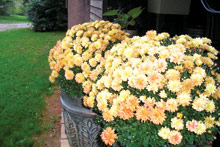When autumn arrives, I can’t resist chrysanthemums. I place them in container pots on my porches, in baskets in my house, and in even smaller baskets in the bathrooms. Kitty is currently destroying the one on my desk by batting the blossoms around.

Live long and prosper: According to folklore, if you place chrysanthemum petals in your glass of wine before you drink, you’ll have a long and happy life. Photo by Cinthia Milner
Each day I cave in to the urge to run by Lowe’s—just once more, I promise myself. Are there any new varieties, colors, shapes or sizes? I treat them as annuals and fill my planters with them. The minute I see mums for sale, I feel my home and garden should be inundated with them. And for once in our gardening relationship, my husband agrees: He loves fall mums, and so do I.
I’m also in love with everyone who places chrysanthemums on their porches. It makes me happy to see house after house displaying gold, red, purple, yellow and burgundy blossoms by their doorways (after all, the Japanese have a chrysanthemum event called the Festival of Happiness). I’m particularly enamored with a lady who lives on one of my daily routes. She has a plant stand that’s stacked like a ladder—each rung big enough to hold one medium-size plant—and it’s stocked with no less than seven chrysanthemums in all colors. Seven—plus two more adorning her walkway. I adore her!
I saw a recent magazine article whose author labeled mums common and overused. The author didn’t mean simply that mums are often seen in gardens, but that they’ve become uninteresting. The writer suggested that we rethink using mums in our gardens—because they’re second only to roses in popularity. So what? That just tells me that gardeners love roses and mums. Would the author call roses “common”? I think not. My husband suggested that perhaps the author had tried to visit our house but couldn’t make it to the front door because of all the mums.
Steamed, I fired off a letter to the editor. At a mere $2.98 a pot and available in dazzling colors, why not get as many as you can? Besides, it’s their very “commonness” (i.e., their popularity) that makes mums so special. In the fall, they rank right up there with apple pies, sweat shirts and stacking wood. They contribute to that wonderful, nostalgic fall feeling. When I see a pot of mums, I have a bizarre desire to go on a hayride—something I’ve never actually enjoyed but still feel the need to do when the leaves change.
The editor wrote back that mums have indeed lost their interest, insisting that the average gardener would do better to grow less-well-known fall flowers (which will remain un-named here due to my loyalty to mums).
Undeterred, however, I did some research that shows just how uncommon and interesting this member of the daisy family really is. And if you love enlivening fall tables and porches with mums, feel free to use this information the next time some gardening snob shows up on your doorstep:
• The emperor of Japan employs the kiku (chrysanthemum) as his seal or coat of arms. (I wonder how he’d feel about being called common.)
• Thus, we English-speaking folks call Japan’s monarchial seat the “Chrysanthemum Throne.” According to Japanese history, it’s one of the oldest remaining monarchies—if not the oldest—in the world.
• In turn, the Japanese emperor may choose to honor a Japanese citizen by awarding him or her the Grand Order of the Badge of the Chrysanthemums (often awarded posthumously, it’s the highest possible honor a citizen can receive).
• First cultivated in China, the chrysanthemum is considered one of of that country’s “Four Gentlemen”: the orchid, bamboo, chrysanthemum and plum blossom. Also called the “Four Noble Ones,” this not-so-common company is often featured in Chinese art because of their refined beauty.
• In 1966, Chicago’s Committee on Beautification proposed that chrysanthemums be named the city’s official flower. Mayor Richard Daley and the City Council approved.
• Introduced to the West in the 17th century, the chrysanthemum is the “birth” flower for November, symbolizing optimism and joy, and the flower for a 13th wedding anniversary. (But watch your colors: White ones symbolize death in some cultures.)
• Pyrethrum, a natural insecticide, is derived from the seed cases of chrysanthemums. Considered to be one of the safer insecticides, it attacks the nervous systems of all insects and inhibits female mosquitoes from biting.
• If you’re superstitious, place chrysanthemum petals at the bottom of your wine glass, pour in your favorite vino and enjoy a long and happy life. The Koreans take the idea a bit further, producing a rice wine that’s flavored with the flower (gukhwaju).
• Steeped or boiled chrysanthemum petals make a sweet drink or medicinal tea, useful for treating such illnesses as the flu. In ancient Chinese lore, the herb chu (chrysanthemum) had the power of life (at the very least, a drink brewed from its roots was said to cure a headache).
With all that, I honestly don’t know how anyone can call a chrysanthemum common. And you can be sure that this fall, my garden will be mummed.
[Cinthia Milner lives in Leicester.]



Before you comment
The comments section is here to provide a platform for civil dialogue on the issues we face together as a local community. Xpress is committed to offering this platform for all voices, but when the tone of the discussion gets nasty or strays off topic, we believe many people choose not to participate. Xpress editors are determined to moderate comments to ensure a constructive interchange is maintained. All comments judged not to be in keeping with the spirit of civil discourse will be removed and repeat violators will be banned. See here for our terms of service. Thank you for being part of this effort to promote respectful discussion.